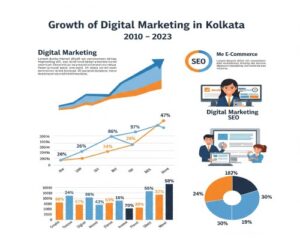In the bustling city of Kolkata, where the healthcare sector thrives with numerous hospitals and medical facilities, the role of digital marketing becomes increasingly crucial. As the world progresses into the digital age, traditional methods of marketing are gradually being overshadowed by more efficient and targeted digital strategies. In this article, we delve into the significance of digital marketing for hospitals in Kolkata, exploring its definition, examples, relevance in the Indian healthcare industry, and its role in empowering both hospitals and medical professionals.
What is Digital Marketing in Hospital?
Digital marketing in the context of hospitals involves leveraging various online channels and platforms to promote healthcare services, reach out to potential patients, and engage with the existing ones. This encompasses a wide range of tactics including search engine optimization (SEO), social media marketing, content marketing, email marketing, and online advertising. For instance, hospitals can utilize SEO techniques to ensure their website ranks higher in search engine results when users look for relevant medical services in Kolkata.
Entrepot Media– A comprehensive approach that includes not only creating engaging content but also managing ad campaigns, optimizing profiles, and analyzing data can make a significant difference in achieving your marketing goals.They understands your target audience and knows how to tailor content specifically for them. They should have a deep understanding of local trends and preferences in Kolkata to ensure maximum impact.
Entrepot Media company with excellent communication skills and responsiveness.
Address-Ps Qube, Action Area II, Action Area IID, Newtown, New Town, West Bengal 700161
Digital Marketing for Hospitals in India
In India, where the healthcare landscape is rapidly evolving, digital marketing has emerged as a powerful tool for hospitals to enhance their visibility, attract patients, and build credibility. With the increasing penetration of the internet and smartphones, Indian consumers are becoming more inclined towards researching medical services online before making healthcare-related decisions. Therefore, hospitals in Kolkata must embrace digital marketing strategies tailored to the local demographics and preferences to stay competitive in the market
Role of Digital Marketing in Healthcare Industry
The role of digital marketing in the healthcare industry cannot be overstated. It serves as a bridge between hospitals and patients, facilitating seamless communication and interaction. Digital marketing allows hospitals to:
Enhance Visibility: By optimizing their online presence through various channels, hospitals can ensure that they are easily discoverable by individuals seeking medical services in Kolkata.
Build Trust and Credibility: Consistent and informative content shared through digital platforms helps hospitals establish themselves as reliable sources of healthcare information, thereby instilling trust among potential patients.
Targeted Advertising: Through tools like social media advertising and Google Ads, hospitals can target specific demographics and geographic locations, ensuring that their marketing efforts reach the most relevant audience.
Patient Education: Digital marketing enables hospitals to educate patients about various health conditions, treatment options, preventive measures, and wellness tips, empowering them to make informed healthcare choices.
Engagement and Feedback: Social media platforms provide hospitals with a direct channel to engage with patients, address their queries, and solicit feedback, fostering a sense of community and loyalty.
Can a Doctor Do Digital Marketing?
Yes, doctors can definitely engage in digital marketing to promote their services, establish their expertise, and connect with patients. In fact, digital marketing offers doctors a powerful platform to reach a wider audience, build credibility, and differentiate themselves in a competitive healthcare landscape. Here’s how doctors can leverage digital marketing effectively:
Personal Branding: Doctors can develop their personal brand by creating professional profiles on social media platforms like LinkedIn, Twitter, or Facebook. By sharing insights, articles, research findings, and engaging with their audience, doctors can establish themselves as thought leaders in their field.
Content Creation: Creating valuable and informative content is key to attracting and retaining patients. Doctors can write blog posts, create videos, or host webinars discussing common health concerns, treatment options, preventive measures, and wellness tips. This content not only educates patients but also showcases the doctor’s expertise and approach to care.

Social Media Presence: Maintaining an active presence on social media platforms allows doctors to connect with patients, share updates, and engage in conversations. Doctors can use social media to share health-related content, patient testimonials, success stories, and promote their services.
Online Reviews and Testimonials: Encouraging satisfied patients to leave positive reviews and testimonials on platforms like Google My Business, Healthgrades, or RateMDs can enhance the doctor’s online reputation and credibility. Positive reviews act as social proof and can influence potential patients’ decision-making process.
Search Engine Optimization (SEO): Optimizing the doctor’s website and online profiles with relevant keywords, meta tags, and quality content can improve their visibility in search engine results. Patients often turn to search engines to find healthcare providers, so appearing at the top of search results can increase the doctor’s chances of being discovered by potential patients.
Email Marketing: Building an email list of patients and subscribers allows doctors to communicate directly with their audience, deliver personalized messages, appointment reminders, health tips, newsletters, and promotional offers. Email marketing campaigns can help doctors nurture relationships with patients and encourage them to engage with their services.
Online Advertising: Doctors can invest in targeted online advertising campaigns on platforms like Google Ads or social media networks to reach specific demographics and geographic locations. PPC (Pay-Per-Click) advertising allows doctors to target relevant keywords and only pay when users click on their ads, making it a cost-effective way to attract potential patients.
Why Healthcare Industry Needs Digital Marketing?
The healthcare industry needs digital marketing for several compelling reasons, all of which are intertwined with the evolving landscape of patient behavior, technological advancements, and the competitive nature of healthcare provision. Here are some key reasons why digital marketing is essential for the healthcare industry:
Changing Patient Behavior: Today’s patients are more digitally savvy than ever before. They turn to the internet to research symptoms, find healthcare providers, read reviews, and seek medical advice. Digital marketing allows healthcare providers to meet patients where they are, engaging with them online and providing valuable information and resources.
Increased Competition: The healthcare industry is becoming increasingly competitive, with numerous hospitals, clinics, and medical practices vying for patients’ attention. Digital marketing offers a way for healthcare providers to differentiate themselves, stand out in a crowded market, and attract patients to their services.
Improved Patient Engagement: Digital marketing enables healthcare providers to engage with patients on a deeper level. Through social media, email marketing, and other digital channels, providers can provide valuable health information, answer questions, and foster meaningful relationships with patients. This increased engagement can lead to better patient outcomes and satisfaction.
Enhanced Visibility and Reach: Digital marketing allows healthcare providers to increase their visibility and reach a broader audience. With effective search engine optimization (SEO), social media marketing, and online advertising, providers can ensure that their services are easily discoverable by patients searching for healthcare options.
Cost-Effectiveness: Compared to traditional forms of marketing, such as print advertising or television commercials, digital marketing can be more cost-effective. With targeted online advertising and email campaigns, healthcare providers can reach specific demographics and geographic locations without the high costs associated with traditional advertising methods.
Data-Driven Insights: Digital marketing provides valuable data and insights that can inform healthcare providers’ marketing strategies. By analyzing metrics such as website traffic, social media engagement, and email open rates, providers can gain a better understanding of patient preferences and behaviors, allowing them to tailor their marketing efforts for maximum effectiveness.
Compliance and Regulation: Digital marketing allows healthcare providers to ensure compliance with relevant regulations and guidelines, such as HIPAA (Health Insurance Portability and Accountability Act) in the United States. By using secure communication channels and following best practices for patient privacy and data security, providers can maintain patient trust and confidence.
Telemedicine and Remote Care: With the rise of telemedicine and remote care options, digital marketing plays a crucial role in promoting these services to patients. Through digital channels, healthcare providers can educate patients about the benefits of telemedicine, provide instructions for accessing virtual appointments, and offer support for remote healthcare delivery.
How Can I Promote My Hospital Online?
Promoting a hospital online involves a strategic approach encompassing various digital marketing techniques:
Website Optimization: Ensure that your hospital’s website is user-friendly, mobile-responsive, and optimized for search engines to attract organic traffic.
Content Marketing: Create informative and engaging content such as blog posts, articles, infographics, and videos to educate and engage your target audience.

Social Media Marketing: Leverage platforms like Facebook, Instagram, and LinkedIn to share updates, health tips, patient testimonials, and promotional offers.
Online Advertising: Invest in targeted online advertising campaigns to reach potential patients through platforms like Google Ads, Facebook Ads, and display advertising networks.
Email Marketing: Build and nurture relationships with patients through personalized email campaigns, newsletters, and health-related updates.
Online Reviews and Reputation Management: Encourage satisfied patients to leave positive reviews on platforms like Google My Business, Yelp, and healthcare review sites to enhance your hospital’s reputation.
Do Doctors Need Digital Marketing?
Yes, doctors can benefit significantly from digital marketing to expand their patient base, establish authority in their specialty, and enhance their professional reputation. By leveraging digital platforms to showcase their expertise, share valuable insights, and connect with patients, doctors can effectively market their services and grow their practice.
FAQs
1. Is Digital Marketing Cost-Effective for Hospitals?
A. Yes, digital marketing offers a cost-effective way for hospitals to reach a targeted audience compared to traditional marketing channels like print or television advertisements.
2. How Long Does it Take to See Results from Digital Marketing Efforts?
A. The timeline for seeing results from digital marketing can vary depending on factors such as the competitiveness of the market, the effectiveness of the strategies deployed, and the consistency of efforts. Generally, hospitals can expect to see noticeable results within a few months of implementing digital marketing campaigns.
3. What are Some Common Digital Marketing Mistakes to Avoid?
A. Common digital marketing mistakes for hospitals include neglecting website optimization, failing to engage with patients on social media, ignoring online reviews, and lacking a cohesive digital marketing strategy
Conclusion
In conclusion, digital marketing plays a pivotal role in the success of hospitals in Kolkata and beyond. By embracing digital strategies tailored to the unique needs and preferences of patients, hospitals can enhance their visibility, credibility, and patient engagement. Moreover, doctors can leverage digital marketing to expand their reach, connect with patients, and establish themselves as trusted healthcare providers. As the healthcare industry continues to evolve, digital marketing will remain an indispensable tool for hospitals and medical professionals striving to thrive in the digital age.








